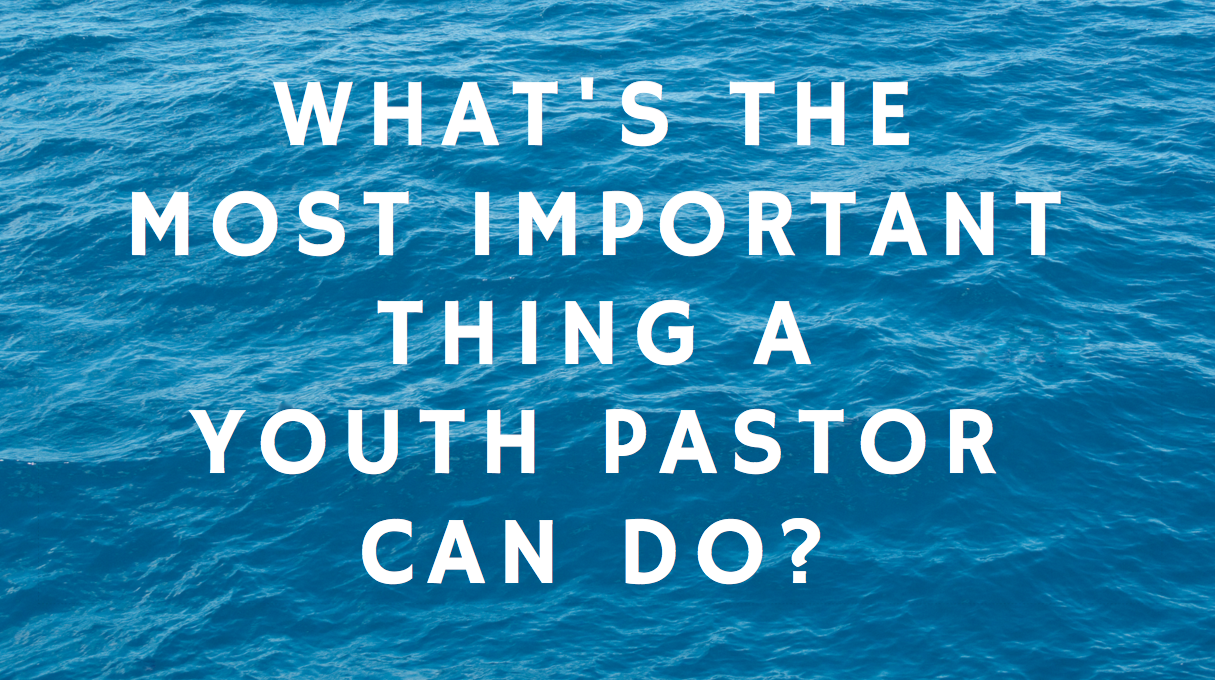The interview was wrapping up. As far as I could tell, I’d handled all of the search committee’s questions with style and skill.
They were tasked with finding a new youth pastor for the church, and I felt like they had asked every question imaginable:
– How would you recruit new volunteers?
– Would you take students on an international mission trip?
– Should we split our middle school and high school students?
– Do you feel comfortable preaching in the adult service?
– How important is it to partner with parents?
– What do you believe about predestination?
– Why are you the best candidate for this job?
I felt good about my answers so far.
The next question was also the last question of the interview:
“What do you think is the most important thing a youth pastor can do?”
I don’t know what they wanted to hear, but my answer seemed to surprise them. It might surprise you too.
Keystone Habits
I noticed something interesting about myself recently. When I work out and exercise, I avoid junk food. When I don’t work out and exercise, I don’t avoid junk food. Not only that, but I’ve noticed that when I stay active, I’m in a better mood, get to sleep more easily, and have more energy. That makes working out, exercising, and staying active a keystone habit for me.
The idea of keystone habits was made popular in Charles Duhigg’s book, The Power of Habit. What is a keystone habit? According to Duhigg, keystone habits “are the ones, that, when they start to shift, dislodge and remake other patterns” (p. 101).
When I’m active, that activity shifts my eating patterns. That’s why it’s a keystone habit. In ministry, your relationship with God is a keystone habit.
Tending to the Stream
John Ortberg tells a tale about an old man who lived in the mountains and served as the Keeper of the Stream. Mostly unseen, he would travel from one spring to the next, removing debris from the water as he went.
One year, the town council decided to spend their money elsewhere. Other things were seen as more important than taking care of streams that no one would see. Roads needed to be repaired, and buildings needed to be built. So the old man was relieved of his duties.
But, high up in the mountain tops, debris started to fill the springs. Trees fell and branches broke off into the water. Mud and silt accumulated. Further down the mountain, other waste contaminated the flow of fresh water.
For a while, no one seemed to notice. Life went on as usual. But after a while, the water wasn’t the same. The clean water, with its refreshing sparkle, had gone away. In its place was water of a brackish kind that no one could enjoy.
The townspeople realized what they hadn’t realized before: their lives were dependent on the stream, and the quality of the stream depended on the important work of the Keeper of the Stream. The city council reconvened and rehired the old man. It wasn’t long before the water was pure again.
Ortberg concludes the story by saying, “The stream is your soul. And you are the keeper” (Soul Keeping, p. 14).
The Most Important Thing
The search committee had asked me a question that I hadn’t expected: What do you think is the most important thing a youth pastor can do?
I answered, “The most important thing a youth pastor can do is stay close to God.”
I wasn’t trying to be spiritual; I was being serious.
They looked surprised, so I elaborated:
If I don’t stay close to God, then this is all for nothing.
If I don’t stay close to God, then my family won’t respect me.
If I don’t stay close to God, then the students will see through me.
My whole ministry depends on me staying close to God.
With that, the interview concluded. I received a call on the way home from the head of the search committee. He told that they loved my last answer and wanted to hire me to be their new youth pastor.
It’s important for you to understand that your ministry is the overflow of your relationship with God. If you aren’t filled with the truth of God and passionate about the love of God, then don’t be surprised if your students aren’t either. Your leadership in this area will set the tone for your ministry; students will follow your lead.
Your Move
In ministry, your relationship with God is a keystone habit. Don’t allow it to take a backseat to programming and planning. As important as those things are, it’s more important for you to stay close to God.
Block out at least an hour each week to read the Bible. Spend some time in prayer. Sing two of your favorite worship songs. Do whatever you need to do to encounter God in a personal way.
That time isn’t wasted. You’re investing in your own relationship with God because that’s the most important thing you can do for yourself, your family, your students, and your church.
Suggested Resource
Latest posts by Trevor Hamaker (see all)
- 7 Ways to Deal with Disruptive Students - November 27, 2024
- Fighting Frustration by Shifting Your Focus - November 27, 2024
- What is the Most Important Job of a Small Group Leader? - November 27, 2024
Did You Like This Post?
Sign up to get updates sent to your inbox each week!
You're in! Want more ideas and support for your ministry? Check out the BYM Community!
http://bit.ly/bymcommunity


3 thoughts on “What’s the Most Important Thing a Youth Pastor Can Do?”
Great thoughts!! I agree w/ what City Youth Worker said, your relationship w/ God is #1 and if I had to say #2 it’s your relationship with the students! They’ll remember the personal connections long after the sermons.
Craig,
Thanks for commenting. You’re right: Love God and Love people. It’s the simplest and best way to have a faithful life that makes a lasting difference.
I am glad to read that the most important thing a youth pastor should do is to stay close to God. Where many are looking for tools and strategies to make their ministry better, the best thing is to be connected with the source. Students will follow you as you are following Christ.
Thanks.
Comments are closed.